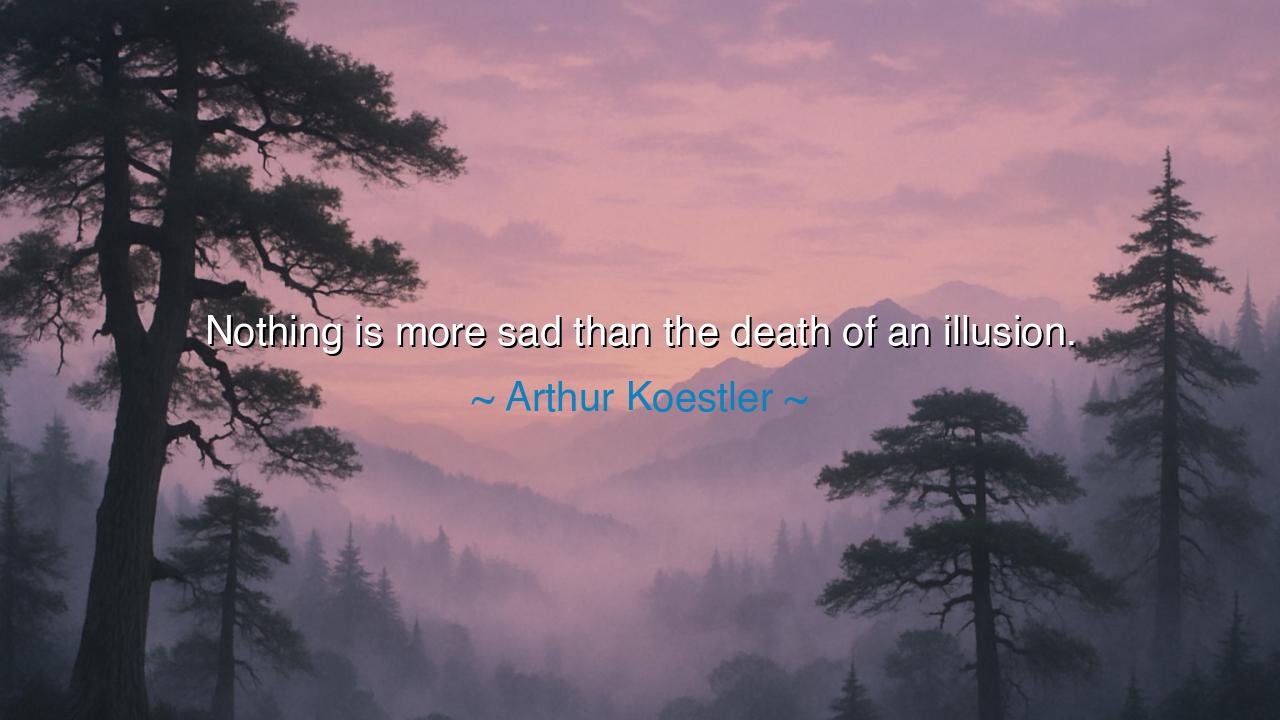
Nothing is more sad than the death of an illusion.






The words of Arthur Koestler, “Nothing is more sad than the death of an illusion,” arise from the ashes of shattered ideals — the cry of a man who saw dreams collide with reality and break upon its stone-hard surface. Koestler, who lived through the political upheavals of the twentieth century, spoke these words not as a poet of despair, but as one who had gazed deeply into the human soul. His quote is a lament for the moment when belief — once radiant with hope — fades and dies, leaving in its place the cold clarity of truth. For it is not reality that wounds us most, but the loss of what we wished reality to be.
To the ancients, illusion was a double-edged gift. It was both the source of art and the seed of delusion. In every age, humanity has needed illusion — the dream that life can be noble, that love can be eternal, that justice can triumph. These illusions give motion to the human spirit, and without them, civilization itself would wither. Yet when these sacred dreams are destroyed — when betrayal, corruption, or loss shatter them — the grief is profound. Koestler, once a believer in political utopias, saw firsthand how beautiful visions could decay into tyranny. Thus, his words carry the sorrow of one who has loved an ideal too deeply, only to watch it die in the light of reality.
This death of illusion is not unique to politics; it touches every human heart. The youth who believes love is perfect, the artist who dreams the world will understand his work, the believer who thinks faith will spare them from suffering — all, at some moment, stand before the ruins of their own illusions. Yet, this sadness is also a kind of awakening. For when the veil is torn, when we see things as they are, we are offered not despair but truth, and from truth arises maturity. The ancients called this passage the initiation of the soul, the painful birth of wisdom.
History offers countless mirrors of this lesson. Consider Galileo, who believed that reason and truth would win the hearts of men when he revealed that the Earth moved around the Sun. Yet the world condemned him; the Church silenced him. His dream that truth alone could conquer ignorance died — but from its death arose the long dawn of scientific freedom. Or think of Koestler himself, who once embraced communism as humanity’s salvation, only to witness its descent into brutality. The death of his illusion became the birth of his greatest work — the unflinching pursuit of intellectual freedom. Thus, sorrow, when embraced with courage, becomes a forge in which higher understanding is formed.
Koestler’s words reveal the paradox of human progress: that disillusionment is the price of growth. Every civilization, every thinker, must pass through the valley where illusions fall away. What begins as heartbreak ends as enlightenment. For to lose illusion is to gain clarity; to see the world without its comforting lies is to begin truly shaping it. The ancients said that truth burns, but only to purify. So too, the death of illusion — though it feels like loss — prepares the soul for wisdom that cannot be deceived.
Yet, Koestler calls it “sad,” and rightly so. There is nobility even in illusion, for it springs from hope, and hope is the most human of all virtues. The dreamer’s sorrow is not shameful; it is sacred. We should not mock those who once believed, nor despise our younger selves for their idealism. The death of illusion should not harden us into cynics but soften us into sages — those who see clearly, yet still dare to hope. The wise heart learns to love truth without losing tenderness.
So, let this teaching descend into your spirit: honor your illusions, but do not worship them. Dream boldly, for dreams give life its color — but when they die, let them die with grace, knowing that something purer is being born in their place. Do not let disillusionment make you bitter; let it make you deep. Seek truth not as an enemy of hope, but as its foundation. For though illusions may perish, the soul that endures their loss emerges immortal — freed from deceit, yet still aflame with meaning. And this, as Koestler would say, is not sadness alone, but the beginning of wisdom.






AAdministratorAdministrator
Welcome, honored guests. Please leave a comment, we will respond soon